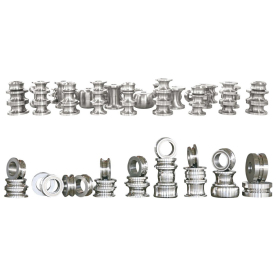Induction heating has become an essential technology in various industrial applications, ranging from metal hardening to the heating of plastics and food. However, one of the most significant advancements in this field is the evolution of customized induction heating equipment. As businesses strive for increased efficiency, reduced costs, and enhanced precision in their manufacturing processes, tailoring induction heating systems to meet specific needs has proven to be not just beneficial but pivotal.
Understanding Induction Heating
Induction heating uses electromagnetic induction to heat electrically conductive materials. When an alternating current passes through a coil, it generates a changing magnetic field, which induces an electric current within the conductive material. This electric current generates heat, allowing for efficient and precise heating without direct contact or the need for a flame.
The Importance of Customization

Revolutionizing Industrial Processes: The Role of Customized Induction Heating Equipment in Modern Manufacturing
Customization is increasingly vital in the industrial sector, where one-size-fits-all solutions often fall short of meeting specific production requirements. Customized induction heating equipment allows manufacturers to optimize their heating processes according to their unique operational demands. This level of specialization can significantly improve productivity, maximize energy efficiency, and minimize waste, all of which are critical in today’s competitive landscape.
Key Advantages of Customized Induction Heating Equipment
1. **Precision and Control**: One of the most compelling benefits of customized induction heating systems is the enhanced precision they offer. Tailored solutions can be designed to heat materials at specific rates and to specific temperatures, ensuring quality and consistency across batches. This is particularly beneficial in industries such as aerospace and automotive manufacturing, where tolerances are tight, and quality standards are sky-high.
2. **Increased Efficiency**: Customized equipment often incorporates advanced technologies that streamline operations. For instance, the configuration of the induction coil can be designed to suit the specific shape and size of the part being heated, minimizing energy loss and maximizing heating efficiency. This design consideration can lead to significant savings in both energy costs and time.
3. **Reduced Downtime**: Customized induction heating systems can be engineered with modular components that allow for quicker maintenance and easier upgrades. This flexibility means that manufacturers experience less downtime, ensuring smoother operations and greater output overall.
4. **Enhanced Safety**: Safety is a paramount concern in manufacturing environments. Custom induction heating equipment can be designed with safety features specific to the working conditions of a particular facility. This may include advanced temperature monitoring systems, automatic shut-offs in case of malfunction, and ergonomic designs that minimize the risk of operator injury.
5. **Sustainability**: As industries become increasingly aware of their environmental impact, customized induction heating equipment can be designed with sustainability in mind. By optimizing energy usage and reducing waste, these systems contribute to a greener manufacturing process. Furthermore, because induction heating is inherently more efficient than traditional heating methods, companies can reduce their carbon footprint significantly.

Revolutionizing Industrial Processes: The Role of Customized Induction Heating Equipment in Modern Manufacturing
Applications Across Industries
Customized induction heating equipment has a wide range of applications. In the automotive industry, it is used for processes like hardening, brazing, and soldering components. In the aerospace sector, it is essential for preparing materials that require precise thermal treatments to meet rigorous safety and quality standards. Additionally, the food processing industry leverages customized solutions for pasteurization and sterilization processes that demand specific heating patterns.

Revolutionizing Industrial Processes: The Role of Customized Induction Heating Equipment in Modern Manufacturing
Conclusion
As technology continues to evolve, the need for customized induction heating equipment becomes increasingly critical. This tailored approach enables manufacturers to meet the precise demands of their production processes, optimize efficiency, and uphold the highest quality standards. As companies seek to differentiate themselves in a crowded marketplace, investing in customized solutions could very well be the key to achieving long-term success and sustainability.
In conclusion, the role of customized induction heating equipment in modern manufacturing cannot be overstated. With its ability to enhance precision, efficiency, safety, and sustainability, it represents a significant leap forward in industrial technology. Companies that embrace this innovation position themselves not only as leaders in their respective fields but also as pioneers in the drive towards a more efficient and sustainable manufacturing future.Solid state HF welder made by Redstar




